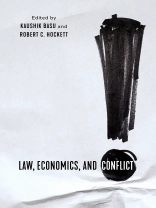In Law, Economics, and Conflict , Kaushik Basu and Robert C. Hockett bring together international experts to offer new perspectives on how to take analytic tools from the realm of academic research out into the real world to address pressing policy questions. As the essays discuss, political polarization, regional conflicts, climate change, and the dramatic technological breakthroughs of the digital age have all left the standard tools of regulation floundering in the twenty-first century. These failures have, in turn, precipitated significant questions about the fundamentals of law and economics.
The contributors address law and economics in diverse settings and situations, including central banking and the use of capital controls, fighting corruption in China, rural credit markets in India, pawnshops in the United States, the limitations of antitrust law, and the role of international monetary regimes. Collectively, the essays in Law, Economics, and Conflict rethink how the insights of law and economics can inform policies that provide individuals with the space and means to work, innovate, and prosper—while guiding states and international organization to regulate in ways that limit conflict, reduce national and global inequality, and ensure fairness.
Contributors: Kaushik Basu; Kimberly Bolch; University of Oxford; Marieke Bos, Stockholm School of Economics; Susan Payne Carter, US Military Academy at West Point; Peter Cornelisse, Erasmus University Rotterdam; Gaël Giraud, Georgetown University; Nicole Hassoun, Binghamton University; Robert C. Hockett; Karla Hoff, Columbia University and World Bank; Yair Listokin, Yale Law School; Cheryl Long, Xiamen University and Wang Yanan Institute for Study of Economics (WISE); Luis Felipe López-Calva, UN Development Programme; Célestin Monga, Harvard University; Paige Marta Skiba, Vanderbilt Law School; Anand V. Swamy, Williams College; Erik Thorbecke, Cornell University; James Walsh, University of Oxford.
Contributors: Kimberly B. Bolch, Marieke Bos, Susan Payne Carter, Peter A. Cornelisse, Gaël Giraud, Nicole Hassoun, Karla Hoff, Yair Listokin, Cheryl Long, Luis F. López-Calva, Célestin Monga, Paige Marta Skiba, Anand V. Swamy, Erik Thorbecke, James Walsh
Inhoudsopgave
Law, Economics, and Conflict: An Introduction, by Kaushik Basu and Robert C. Hockett
1. The Interim Balance Sheet of Democracy: A Machiavellian Memo, by Célestin Monga
2. The Third Function of Law: Its Power to Change Cultural Categories, by Karla Hoff and James Walsh
3. Fighting Corruption in China: The Roles of Formal and Informal Institutions, by Cheryl Long
4. Overreliance on Law: Rural Credit in India, 1875–2010, by Anand V. Swamy
5. Forgotten Markets: The Importance of Pawnshops, by Marieke Bos, Susan Payne Carter, and Paige Marta Skiba
6. New Technology, Increasing Returns, and the End of the Antitrust Century, by Kaushik Basu
7. Law and International Monetary Policy Regimes, by Yair Listokin
8. Why Economics Is a Moral Science: Lifting the Veil of Ignorance in the Right Direction, by Gaël Giraud
9. Exchange Configurations and the Legal Framework, by Peter A. Cornelisse and Erik Thorbecke
10. Reimagining Governance through the Role of Law: A Perspective from the World Development Report 2017, by Luis F. López-Calva and Kimberly B. Bolch
11. Beyond Law and Economics: Legitimate Distribution without Legislation?, by Nicole Hassoun
Over de auteur
Kaushik Basu is Professor of Economics and the Carl Marks Professor of International Studies at Cornell University and author of The Republic of Beliefs. Follow him on Twitter @kaushikcbasu.Robert C. Hockett is the Edward Cornell Professor of Law at Cornell Law School. Follow him on X @rch371.












